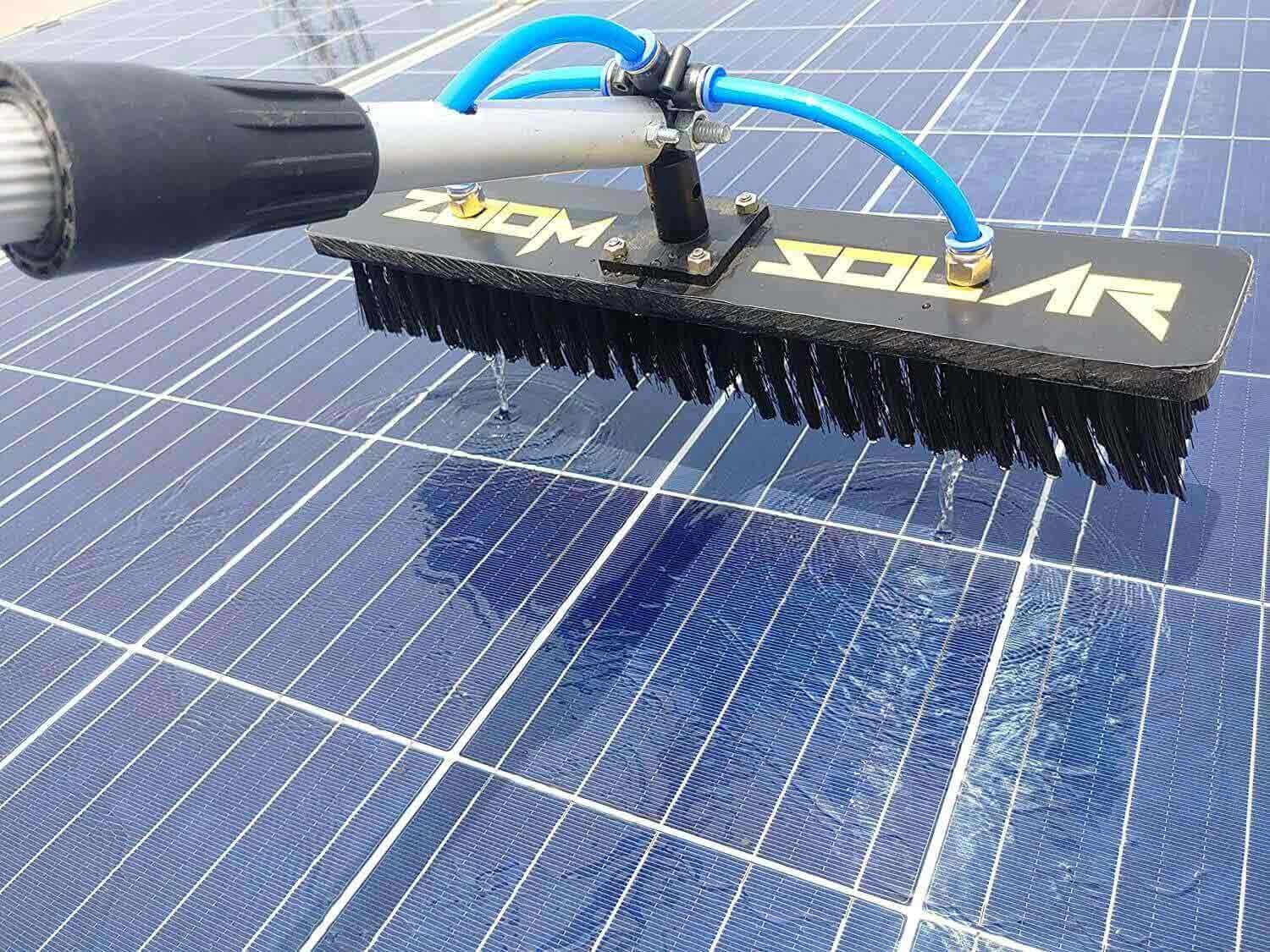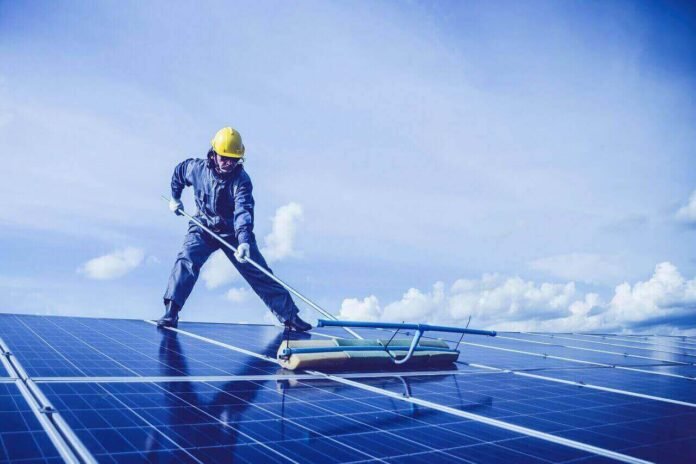I have my rooftop solar panels got installed last year.
The next thing that needs to be considered after the installation of solar panels is – how to clean rooftop solar panels?
Let me tell you one should not randomly clean those solar panels.
Cleaning processes will be determined by the site’s condition, water quality, and cleaning mechanism.
I would strongly recommend reading the manufacturer’s manual thoroughly and comprehending the instructions because the manufacturer knows best about their products.
Why you should clean rooftop solar panels?
Dirt and dust may accumulate on the module’s glass surface over time, lowering the module’s power output and, in the long run, affecting the module’s reliability.
The dust accumulation obstructs the solar light which falls on PV cells resulting in low power generation.
To achieve maximum power production, the house owner must clean solar panels regularly.
At their 1.6 MW solar farm in Mountain View, California, Google executed an experiment.
Cleaning the solar panels was discovered to be “the number one strategy to maximize the energy they produce.”
Solar panels that had been in use for 15 months were cleaned and their output of electricity was doubled.
It’s realistic to anticipate that if solar panels aren’t cleaned correctly, they’ll lose at least 10-20 percent of their efficiency.
This implies they will generate 10-20 percent less electricity, which you will now have to purchase from the utility company at their prices.
Let me give an example. Assume a solar system installed of 3 kW. The 3 kW solar system can generate roughly around 350 kWh per month.
Considering 20 percent loss in energy generation results in 280 kWh monthly generation instead of 350 kWh.
Thus, the yearly loss of power generation would be 840 kWh.
That makes a total of Rs.6720/- (considering a tariff of Rs.8 per kWh) which is completely wasted.
This simply adds many years to the repayment period.
Thus, rooftop solar panels must be cleaned at regular intervals.
How to Clean rooftop solar panels?
Now that you have understood why to clean solar panels now let us discuss how to clean them.
General Guidelines
- Cleaning should only be done when the module is in open circuit mode or when the inverter is turned off.
- Spraying the Modules (solar panels) with low-pressure water that is precisely matched in temperature to the Module or using a dry-cleaning approach are both acceptable Module cleaning procedures.
- When it comes to water, RO water is the greatest option. If RO water is not available, tap water with a low mineral content (less than 75 mg/L) should be utilized.
- If necessary, a mild, non-abrasive, non-caustic detergent mixed with 500 mg/l tap water and a pH of 6.5 to 8.5 at 25°C can be used.
- In case you have stubborn marks or bird poop, use a soft sponge, microfiber cloth, or non-abrasive brush to lightly wipe over the stained area. For a longer reach, this can be installed on an extension pole.
- To avoid slipping and falling, use rubber-soled shoes with a strong grip.
Different Methods for Cleaning rooftop solar panels
Option #1
This option is very easy and can be opted for small solar systems having a minimum height (can be accessible by standing on the ground).
Step 1: Connect the hose to the tape.
You have to sprinkle water on solar panels using the hose. Get the hose if you do not have one.
Step 2: Get access to rooftop solar panels.
Make sure that you can access the solar panels standing on the floor.
Step 3: Sprinkle the water on the panels.
Make sure that you use low pressure while sprinkling the water on panels.
Option #2
Step 1: Get a telescopic pole solar cleaner.
Telescopic poles have a longer length. They have a soft brush with a water-fed arrangement in-built.

Step 2: Get the ladder.
Use a sturdy and safe ladder.
Safety Caution!
Throughout the cleaning procedure, apply fall-safe and personal-protection measures when working at heights.
Step 3: Connect the telescopic pole solar cleaner with tape.
Telescopic pole solar cleaner comes with an arrangement so that you can directly connect it to tape.
Step 3: Sprinkle the water on the solar panels.
While sprinkling the water on the solar panels gently wipe off the panels (giving downwards strokes).
Do’s and Don’ts
Now that you know how to clean rooftop solar panels, you must know certain do’s and don’ts to avoid any damage to the panels.
- Do not stand on solar panels for cleaning. It can damage the panels resulting in a poor generation.
- Do not clean solar panels when solar panels are very hot. The difference in glass temperature and water temperature can break or fracture the glass.
- Do not clean the back surface of the solar panel. The back surface has junction boxes and sprinkling water on it is strictly prohibited. It can give you an electric shock. Also can damage the panel.
- Do not use knives, blades, and other sharp materials to clean hard stains like bird poop. It can severely damage the panel.
- Do not use high-pressure hoses to clean the panels.
- Don’t use harmful chemicals for cleaning solar panels.
- Do wear rubber sole shoes while cleaning solar panels.
Which is the best time to clean solar panels?
In the afternoon, the sun is shining at its peak. At that time the solar panels are damn hot. Sprinkling cold water on a hot surface can break the glass (as mentioned in do’s and don’ts).
Also, it can increase the thermal stress on the system.
Another reason is when the sun is shining the panel generates electricity. It is like a powerhouse. If any of your panels is damaged, it can give a severe electric shock.
You should clean the panels when panels are not generating any electricity. At night the panels are not producing electricity but practically it is not advisable due to visibility issues.
So the best time, in my opinion, is during sunrise between 6 a.m to 7 a.m (when there is clear visibility).
How often you should clean your solar panels?
The frequency of cleaning should be determined based on the power production from modules, the site environment, and the season.
If the site is in a dusty environment, then you may need to clean it frequently.
Let me tell you the best way.
The best way to determine whether to clean solar panels or not is by monitoring the power generation.
If you see a sudden drop in power generation, go and check the panels for any dust accumulation. If you find dust clean it. Now again monitor the power generation. You would find improvement. Practicing this twice or thrice would give you a generalized idea. You can repeat it every time.
You can also determine the frequency of cleaning.
I do follow the same thing for my rooftop solar panel.
However, if you are unable to monitor the power generation then clean at least once a month.
If the environment is dusty clean panels every fortnight.
Key Takeaways
- Solar panel efficiency can be harmed by bird droppings, dust, and pollution.
- Allowing your solar panels to become dirty reduces solar production, lengthening your solar payback period.
- If you live in an arid environment or near a pollution source, or if your panels are positioned flat, you may need to clean them more frequently.
- To determine the impact of cleaning, measure solar output before and after the cleaning and modify the cleaning frequency accordingly.
Also See other Solar Related Articles
- How to choose solar panels? – 9 Key Factors to Consider before buying Solar Panels
- What is net metering and how does net metering work?
- Solar Sizing Calculator
- How to calculate number of Solar Panels for home?
- How many Units does a 5kW Solar Panel Produce?







Very useful for non-technical people…for those who are planning to buy and are already utilizing it.